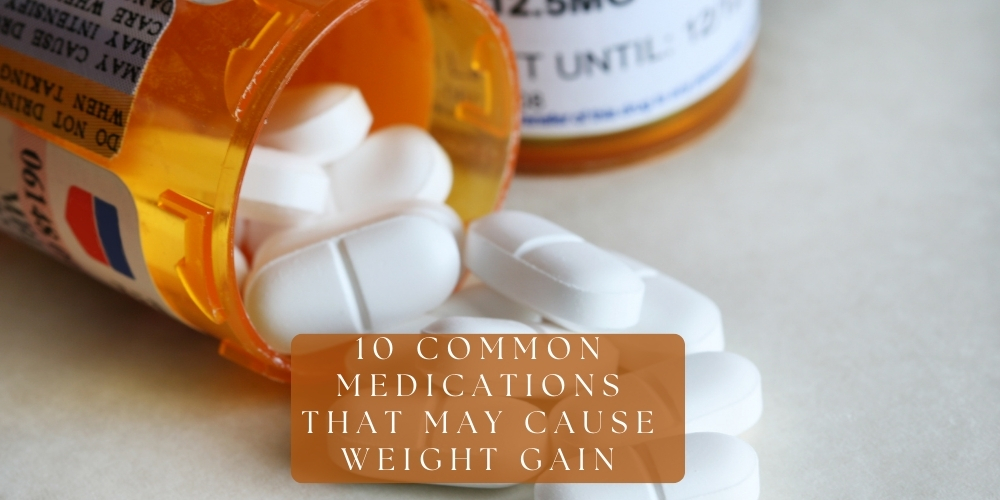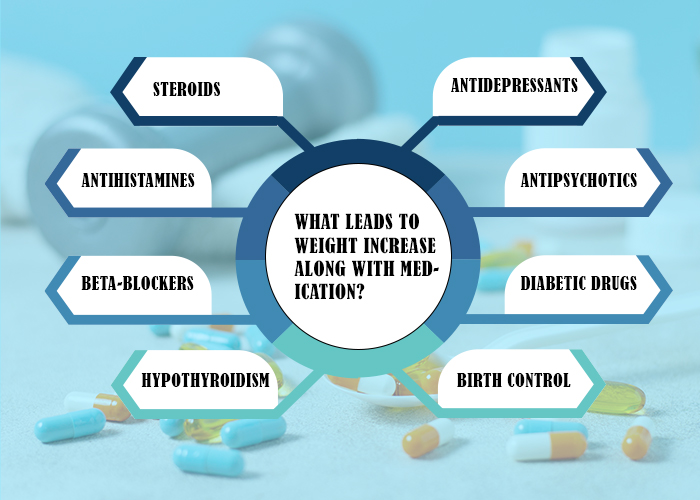With practically any drug, side effects are common. Less frequently seen are adverse effects that may make it more difficult for you to recover from the exact illness you are trying to treat. One example would be drugs that may result in weight gain. Let’s talk about 10 Common Medications That May Cause Weight Gain.
“We frequently consider side effects that result in more symptoms, such as fatigue, stomach issues, and dizziness,” says John Batsis, M.D., an associate professor of medicine in the University of North Carolina at Chapel Hill’s Department of Medicine and Nutrition. However, weight gain might sneak up on you. Furthermore, according to Batsis, “the excess weight can potentially worsen” problems such as high blood pressure or osteoarthritis in individuals. 10 common medications that may cause weight gain is given below:
What leads to weight increase along with medication?
Different drugs have different reasons for weight gain. Some could make you feel hungrier and entice you to eat more, which could lead to the gain of a few pounds. Others may lower your metabolic rate, which would slow down the rate at which calories burn. In addition, your body may retain water if you take specific drug types. Even if this doesn’t indicate that you’ve gained weight, it will make you appear heavier on the scale. According to the University of Rochester, there are other situations in which your body’s ability to store and absorb sugar and other nutrients may be compromised.
Here’s how medications that treat anxiety, depression, arthritis, or allergies may impact your weight, whether you’re taking a steroid to manage your pain or an antihistamine to stop your sniffles and sneezes. 10 common medications that may cause weight gain is given here:
Antidepressants:
A number of antidepressants, including tricyclics, monoamine oxidase inhibitors (MAOIs), and selective serotonin reuptake inhibitors (SSRIs), have been linked to weight gain. Amitriptyline (Elavil), doxepin (Silenor), and nortriptyline (Pamelor) are some of these drugs. “Weight gain may be stimulated by these drugs as a class,” explains Jessica Nouhavandi, PharmD, co-founder and co-CEO of Honeybee Health, located in Culver City, California. According to Harvard Health Publishing, if you’re taking antidepressants, talk to your doctor about it before stopping abruptly and create a plan that will best support your mental health. See your physician about moving to a different class of antidepressants if you feel like quitting your prescription because of weight gain.
Antipsychotics:
Drugs like olanzapine and clozapine, which are prescribed to treat mental health issues like schizophrenia and bipolar disorder, can cause weight gain. You have probably taken antihistamines if you have allergies or if you have ever experienced an itchy rash. According to Ellis, research indicates that those who regularly use specific antihistamines have greater waist circumferences and body weights than those who do not.
Mood stabilizers:
Lithium and valproate, two mood stabilizers used to treat bipolar disorder, have been connected to weight gain.
Diabetic drugs:
Keeping a healthy weight is crucial to any type 2 diabetes treatment plan. The problem is this, though: A number of the medications used to treat the illness can cause weight gain. Consider injectable insulin, for example. The hormone facilitates the body’s cells’ absorption of glucose. However, when cells take too much glucose and the body turns it into fat, insulin produces a spike in weight. Insulin is not always used by people with type 2 diabetes. Yet this negative effect is not unique to type 2 diabetes medications. Insulin, sulfonylureas, and thiazolidinedione are a few examples of diabetic medications that may increase hunger and cause weight gain in certain people.
Birth control pills:
Although the research is inconclusive, some women may gain weight as a side effect of various hormonal birth control techniques.
Steroids:
Used to treat inflammation, allergies, and asthma, corticosteroids can stimulate hunger and promote fluid retention, which can result in weight gain.
Antihistamines:
Certain antihistamines, such as those from the second generation, have the potential to enhance hunger and cause weight gain.
Beta-blockers:
Drugs like propranolol and metoprolol, which are used to treat anxiety, headaches, and high blood pressure, may cause weight gain. The action of beta-blockers is to lower blood pressure by decreasing the heart’s workload, heart rate, and blood output. They are therefore frequently recommended as a therapy for angina, hypertension, and irregular heartbeats. It doesn’t need to be said to you that beta-blockers can cause slow heartbeat, lethargy, and insomnia as adverse effects. All of those can lead to a lifestyle that is less physically active, which naturally can lead to weight gain. According to Batsis, “weight gain typically happens in the first few months after starting beta-blockers like atenolol or metoprolol.” It is “thought to be due to changes in skeletal muscle metabolism, insulin sensitivity, and metabolism changes.”
Anticonvulsants:
Pregabalin and gabapentin are two examples of anticonvulsant drugs that can make some people gain weight.
Hypothyroidism medicine:
Although treatment for hypothyroidism, or an underactive thyroid, typically helps stable weight, some people may gain weight while their hormone levels are adjusted.
How do you handle weight gain brought on by medication?
You still have control over the excess weight even if you are unable to change medications. You should think about scheduling a consultation with a licensed dietician, who can guide you in selecting better foods. Increased physical activity, particularly a mix of aerobic (such as brisk walking) and strength training, can also assist cure weight gain. It’s challenging to resist weight reduction brought on by medicine, according to Batsis. “It’s important to try to involve people in health promotion initiatives.”
Furthermore, Batsis advises avoiding using anti-obesity medications to shed the extra pounds, despite the temptation to do so. Polypharmacy is the term for when taking one drug to treat the side effects of another. This can be problematic.
Conclusion:
Common medications that may cause weight gain are not only minor issues. Please be aware that not everyone reacts to medications the same way, and weight gain is not a side effect that can occur to everyone using these drugs. It’s critical to discuss any worries you may have regarding weight gain with your healthcare professional. They might be able to recommend helpful strategies to handle any possible weight-related side effects or alternative therapies. It is imperative to stress that prescribing a medicine should only be done after carefully weighing the advantages and disadvantages. Talking to your healthcare provider about weight gain and other medication-related side effects is crucial if you are worried about them. They may suggest different medications with lower risks of weight gain or offer advice on how to manage side effects.



